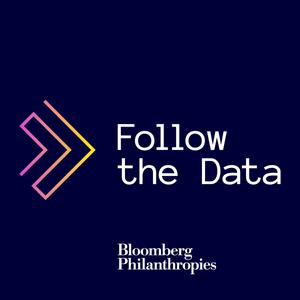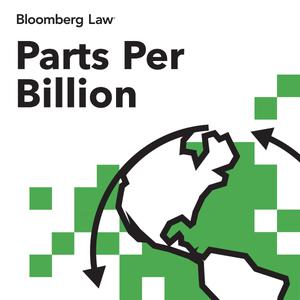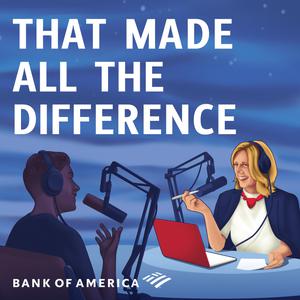
Follow the Data Podcast
Follow the Data
Podcast by Bloomberg Philanthropies
- 24 minutes 36 seconds145. In Defense of Democracy
Around the world, public leaders are confronting a growing distrust in government.
In these divided times, a mayor’s work becomes increasingly important. As the governing body closest to their residents, they are often the ones left reminding their communities of what we have in common—and why those things are worth fighting for.
So how can local leaders proactively take the lead on building social solidarity, and rebuilding trust in government, from the bottom up? We looked to Istanbul, Turkey for a bold answer.
Istanbul Mayor Ekrem İmamoğlu is addressing this increasingly global challenge in his city with his Bloomberg Philanthropies’ Mayors Challenge-winning project, Pay-It-Forward, which leverages municipal data to match residents in need with community members that can provide support. From helping neighbors pay utility bills during the pandemic to rallying global aid during a national earthquake disaster, this city-led platform brings people together to solve challenges. Since its inception, it has delivered over $12 million USD in aid.
On this episode of Follow the Data, James Anderson, who leads Bloomberg Philanthropies’ Government Innovation program, joins Mayor İmamoğlu on stage at Bloomberg CityLab 2024 in Mexico City to discuss the state of democracy from the ground floor of cities, and how solutions like Pay-It-Forward offer an inspiring path for mayors around the world to build social cohesion locally and around the world, at scale.
27 November 2024, 2:45 pm - 24 minutes 47 seconds144. A Home for Arts and Culture in Lower Manhattan
Last year, the Perelman Performing Arts Center opened in New York City - the last major piece in the rebuilding of the World Trade Center site. Its opening marks a new chapter in the story of Lower Manhattan as a center of culture and creativity.
The space - dubbed PAC NYC for short - includes three theatres with movable walls and seats that expand and contort to create endless possibilities of layouts to stage a wide variety of shows. From a reimagination of Andrew Lloyd Webber’s Cats to free programming on the lobby stage, PAC NYC’s inaugural year has hosted an impressive range of performances.
Over the past year, PAC has welcome around 200,000 guests into their building and hosted 238 separate free performances with artists from 24 different countries.
On this episode of Follow the Data, Katherine Oliver is joined by Khady Kamara Nunez, Executive Director of PAC NYC, and Bill Rauch, Artistic Director of PAC NYC, to celebrate the one-year anniversary of the PAC's opening. Together, they discuss what drew them to working at this brand-new venue and what's to come for the Perelman Performing Arts Center.
4 October 2024, 3:57 pm - 20 minutes 49 seconds143. A New Frontier for Local Government: Generative AI
Generative artificial intelligence has the potential to transform local government. That’s why city officials everywhere are working to harness its promise—from redesigning infrastructure to reimagining emergency response—alongside managing its pitfalls.
Still, it’s a new frontier for municipalities, one that’s especially difficult to confront without the help of peers. To bridge the gap, in October 2023, our Government Innovation program at Bloomberg Philanthropies together with the Bloomberg Center for Government Excellence (GovEx) at Johns Hopkins University launched City AI Connect: a global learning community and digital platform for cities to trial and advance the usage of generative artificial intelligence to improve public services—together.
Building on more than a decade of bolstering data capabilities in city halls, our City AI Connect team has spent the past 8 months in the artificial intelligence-trenches with local officials. Each day on the platform, more than 500 city leaders convene to experiment, strategy-share, and navigate the intricacies of putting this emerging technology to work for residents’ benefit.
On this episode of Follow the Data, Katherine Oliver sits down with Claudia Juech from our Bloomberg Philanthropies Government Innovation program team alongside Denise Riedl, Chief Innovation Officer of the City of South Bend, Indiana and Kyle Patterson, Chief Innovation Officer of the City of Boise, Idaho—two City AI Connect super users—to hear about the innerworkings of this new effort. They also discuss how their cities—and peers in other cities—are capitalizing on the generative artificial intelligence movement to bring their governments—and communities—into the future, for good.
22 July 2024, 4:20 pm - 31 minutes 14 seconds142. Using Data to Tackle Air Pollution
Air pollution is now the second leading risk of death worldwide, accounting for 8.1 million deaths globally in 2021.
As the world’s urban population grows, it is critical for policymakers and citizens to have access to data-driven scientific research that can empower communities and inform important environmental, air quality, and public health policy decisions.
The State of Global Air 2024 report by the Health Effects Institute provides a comprehensive analysis of data for air quality and health impacts for countries around the world. It serves as a key resource for governments and initiatives such as Breathe Cities, informing their work supporting cities to curb their air pollution and climate emissions.
On this episode, Katherine Oliver sits down with Antha Williams, who leads the Environment program at Bloomberg Philanthropies, Dr. Pallavi Pant, who leads the Global Health program at the Health Effects Institute, and Jaime Pumarejo, the first-ever Executive Director for the Breathe Cities initiative and the former Mayor of Barranquilla, Colombia, to discuss the state of global air pollution, how policymakers can use air quality data to inform their work towards climate progress, and why it’s important to tackle this issue at the local level to improve and save lives.
3 July 2024, 3:46 pm - 28 minutes 23 seconds141. The Invisible Shield that Protects Us
From vaccines to seat belts, public health measures have significantly impacted our lifespans and quality of life for decades.
And yet, the work itself is often underfunded, undervalued, and misunderstood.
The Invisible Shield, a new four-part documentary series on PBS – produced by RadicalMedia and made possible by Bloomberg Philanthropies, explores the hidden public health infrastructure that makes modern life possible. Featuring interviews and insights from public health leaders and global experts, the series examines the field’s major achievements and the dedication of the public health sector in times of crisis.
On this episode, Katherine Oliver sits down with two public health experts featured in The Invisible Shield, Dr. Sandro Galea, Dean of the Boston University School of Public Health, and Dr. Joshua Sharfstein, Vice Dean for Public Health Practice and Community Engagement at the Johns Hopkins Bloomberg School of Public Health, to discuss how they started their careers, the importance of data collection, and the biggest obstacles to implementing public health policies.
15 May 2024, 6:11 pm - 20 minutes 25 seconds140. Tackling Air Pollution in Poland
Poland has some of the most toxic air in all of Europe, with 23 of the 50 most polluted cities in the European Union located in the country.
Much of this air pollution comes from common household boilers that burn wood and coal. Emissions from cars and factories exacerbate poor air quality and lead to 40,000 deaths from pollution-related illnesses every year.
Launched in 2015, Polish Smog Alert is a campaign group comprised of more than 50 local clean air initiatives dedicated to improving air quality in Poland. By increasing public awareness of the health impacts of air pollution and introducing anti-smog regulations at both the local and national levels, this movement has helped secure policy change that has improved air quality and public health across the country.
In 2023, Polish Smog Alert was named an Earthshot Prize Finalist in the “Clean Our Air” category, and the group receives tailored support from the Prize's Global Alliance of partners to continue making a difference and driving urgent climate action. Our founder, Mike Bloomberg, serves as Global Advisor to the Winners of The Earthshot Prize, and Bloomberg Philanthropies – alongside Bloomberg LP – has supported The Earthshot Prize since its creation in 2020 as a Global Alliance Founding Partner.
On this episode, Katherine Oliver sits down with Polish Smog Alert co-founders Anna Dworakowska and Andrzej Guła to discuss the group’s mission to clean the air, their experience with The Earthshot Prize, the successes they have had so far, and where they will go from here.
2 May 2024, 1:39 pm - 21 minutes 21 seconds139. Driving Urban Innovation in Cities Around the World
Solutions to many of the greatest challenges we face depend on the progress of cities.
Local leaders are uniquely positioned to bring about real change that has tangible impact for residents, but often, they don’t have the resources to do so. How can we support city governments in bridging this gap, so they have the capabilities they need to move communities forward?
The Government Innovation team at Bloomberg Philanthropies focuses on providing mayors and local government officials with the tools and support they need to tackle the pressing problems they face and improve people’s lives.
On this episode, James Anderson, who leads Bloomberg Philanthropies’ Government Innovation program, joins Nneka Sobers, the Assistant Director of Product Development at the Urban Tech Hub at Cornell Tech, to discuss how Bloomberg Philanthropies works with city halls around the world to strengthen their problem-solving capacity and increase their use of data, innovation, and cross-sector collaboration by providing leadership training, programs, and an infrastructure that allows for urban ideas to spread across cities worldwide.
This audio is adapted from their recent conversation at the Urban Tech Summit hosted at Cornell Tech, where academics, entrepreneurs, policymakers, and industry and public sector leaders gathered to discuss how cities can drive decarbonization around the world.
3 January 2024, 4:36 pm - 31 minutes 49 seconds138. Tackling the Tobacco Industry Around the World
Tobacco use is the world’s leading cause of preventable death.
Since the mid-20th century, the tobacco industry has used deliberate marketing tactics to confuse the public about tobacco’s harmful effects, causing billions of deaths globally from tobacco use and second-hand smoke. However, a growing number of countries and organizations around the world are standing up to the tobacco industry and taking strong action.
Since its launch in 1995, the Campaign for Tobacco-Free Kids has tackled the tobacco industry head on. And since the launch of the Bloomberg Initiative to Reduce Tobacco Use in 2007, the arch of the fight against tobacco has changed drastically – in turn, saving millions of lives. Despite this progress, the data shows that there's still a lot of work to be done. While cigarette use declined exceptionally over the years, the tobacco industry has found ways to reinvent itself through social media ad campaigns and colorful, fun-flavored e-cigarettes tailor made for kids.
On this episode, our host Katherine Oliver, sits down with Matt Myers, outgoing President of the Campaign for Tobacco-Free Kids and Yolonda Richardson, the Campaign’s current President, to share more about the arduous battle against the ever-evolving tobacco industry and its deceptive marketing to kids and low-income communities around the world.
14 December 2023, 1:10 pm - 32 minutes 34 seconds137. How Can We Reduce the Gaps in Racial Wealth Equity Data?
Data plays a critical role in helping build a more equitable society. As leaders and organizations across the country grapple with how to strategically invest in Black communities, having access to relevant data about wealth equity in the U.S. is essential. Unfortunately, that data is often out-of-date, inaccessible, not disaggregated by race, and not available at the local level.
So, how can we work to reduce the gaps in racial wealth equity data?
Supported by the Bloomberg Philanthropies’ Greenwood Initiative, the Black Wealth Data Center works to remedy the problem of insufficient and inaccessible data on the topic of Black wealth. By making relevant data disaggregated by race available, the Black Wealth Data Center's Racial Wealth Equity Database empowers leaders to leverage the data necessary to develop and implement effective programs and policies to increase racial wealth equity.
To celebrate the Black Wealth Data Center’s recent one-year anniversary, Katherine Oliver sits down with Garnesha Ezediaro, who leads Bloomberg Philanthropies’ Greenwood Initiative, Darrick Hamilton, the Founding Director of the Institute for the Study of Race, Stratification and Political Economy at the New School, and Lamar Gardere, the Executive Director at The Data Center of Southeast Louisiana and national recipient of the Black Wealth Data Center and National Neighborhood Indicator’s Local Data and Engagement Grant Program, to discuss the importance of data in advancing racial wealth equity, the challenges faced by organizations that don’t have access to data, and how the Black Wealth Data Center is helping provide decision-makers with data collection and accessibility.
7 December 2023, 6:44 pm - 24 minutes 44 seconds136. How Can We Support Student Success at All Stages?
The future of our country depends on bold changes to education to ensure that all students are able to realize their full potential.
According to The National Center for Education Statistics, in 2022, average mathematics scores at fourth grade declined across the country. Furthermore, only a third of Americans have a bachelor’s degree or higher, while there continues to be major shortfalls of qualified candidates for “middle skills jobs."
How can we improve student achievement and provide them with viable pathways to jobs that lead to long-term economic mobility
Building on more than a decade of education reform work from Mike Bloomberg’s time as mayor, Bloomberg Philanthropies’ Education program works to ensure that all students have the skills and opportunities to succeed in the 21st century. From supporting the growth of charter schools to investing in programs that help young people get the specialized training they need, our Education program works alongside partners to implement initiatives that will make a significant difference for the children most in need of a great education and chart a path to a successful future.
On this episode, Katherine Oliver sits down with two colleagues from Bloomberg’s Education team – Eve Bois, who manages the Career and Technical Education portfolio, and Jasmine Jenkins, who co-manages the K-12 Education and Advocacy portfolio, to discuss the challenges facing public education in America, Bloomberg Philanthropies’ comprehensive education reform work, and how we are expanding post-secondary opportunities for students through school-based and work-based programs.
1 November 2023, 9:00 am - 26 minutes 2 seconds135. Can the Arts Keep You Healthy?
Everyone knows that an apple a day keeps the doctor away, but can singing in the shower also help? What about seeing a play or taking a painting class? For the past two years, Bloomberg Philanthropies has supported the EpiArts Lab, a National Endowment for the Arts Research Lab based at the University of Florida’s Center for Arts in Medicine in partnership with University College London. The EpiArts Lab has analyzed longitudinal datasets that follow thousands of U.S. residents from all demographics, over several decades to understand whether participating in the arts has long-term benefits for public health.
While we continue to grapple with the mental health fall out of the pandemic, crises caused by climate change, the polarized political landscape, and the marginalization of certain populations…..now more than ever, people are looking for relief.
The good news is, EpiArts Lab has produced over a dozen peer-reviewed papers uncovering the impacts of arts activities on health indicators in various populations, with compelling findings.
In this episode of Follow the Data, Katherine Oliver sits down with Jill Sonke, PhD, director of research initiatives in the Center for Arts in Medicine at the University of Florida, and Tracey Knuckles of our arts team to shed light on the ways that cultural activities can help keep you healthy and how the arts can be incorporated into healthcare systems.
15 September 2023, 6:55 pm - More Episodes? Get the App
Your feedback is valuable to us. Should you encounter any bugs, glitches, lack of functionality or other problems, please email us on [email protected] or join Moon.FM Telegram Group where you can talk directly to the dev team who are happy to answer any queries.
 Parts Per Billion
Parts Per Billion
 Zip Code Economies
Zip Code Economies
 Travel Genius
Travel Genius
 What Goes Up
What Goes Up
 Talking Green
Talking Green
 That Made All the Difference
That Made All the Difference